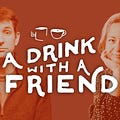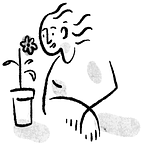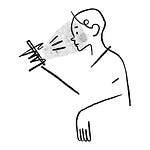Doomscrolling is a new-but-real habit in our culture, and it’s not good for us — yet we all fall prey to its siren song of despair. What’s the counter, even sacramental, practice for staying informed and involved without losing hope? Seth and Tsh have thoughts and ideas.
Seth’s website and newsletter
Tsh’s website and newsletter
It’s not too late to order Shadow & Light
It Can’t Happen Here, by Sinclair Lewis
The Social Dilemma (on Netflix)
Into the Lantern Waste, by Sarah Sparks
Dear Wormwood, by The Oh Hellos
Browse Tsh’s recommended books
Pay what you want for Tsh’s audio workshop, Create Your Rule of Life
Check out all the shoes, bags, and masks available right now at Rothys.com/GOODLIST.
Go to ThirdLove.com/GOODLIST now to find your perfect-fitting bra and get 10% off your first purchase
Tsh: This is The Good List and Tsh Oxenreider. In this episode, I am joined by my friend again, Seth Haines, as we continue our chat that we're calling A Drink with a Friend. We're talking about sacramentality, what it looks like to live with a sacramental mindset. We've got several episodes already in the feed for you, the introduction to sacramentality, advent and addiction. And this particular episode, I think will resonate with a whole lot of you because it's pretty universal these days. Before we get into that though, we want to talk about what we're drinking. Seth, tell me more about what's in your cup.
Seth: Yes. I am drinking a coffee from Onyx Coffee Labs, which is my local coffee shop, I know we’ve talked about this before, these guys are world-class. They do not pay me to say this. They have never paid me to say this. I just really love what they're doing. I'm drinking their brew called Monarch. It's French pressed. I French pressed this just before we started recording. They say that the flavor profile is dark chocolate, molasses, red wine, dried berries, and they claim it is thick and syrupy though I didn't really put enough grounds in to make it thick and syrupy, but I will attest to all the other flavor profiles. This has been my coffee of choice lately. I love it.
Tsh: Do you put anything in your coffee?
Seth: No, that is heresy. Tsh, we've talked about this before. I try to be really ecumenical. I try to have some broad downs for people, we're all on our own journeys and I get that, but when we put a cream or sugar into our coffee, that's where I just have to draw the line and say there are some heretical bounds I won't cross. And that's one of them.
Tsh: I love that. That makes me feel so much better because I'm such a purist too. The way I describe it is if you need that stuff, then you're not drinking the right coffee. That's kind of how I feel. Yeah.
Seth: Just drink big box store coffee.
Tsh: That's right. We sound like such snobs.
Seth: We are.
Tsh: That’s okay.
Seth: Well, what are you drinking? I hope it's as good as what I'm drinking.
Tsh: It's admittedly not. What I'm drinking today is reflective of the fact that it's in the eighties today, even though it's freaking fall. I'm drinking sparkling water that’s grapefruit flavored and not even LaCroix, but the grocery store brand. We have a local grocery store brand in Texas called HEB that everyone is super loyal to. We love HEB here in Texas and they actually make a really good sparkling water and it's so much cheaper than LaCroix. So we buy it all the time and we are a little ashamed of how fast we go through this, but we don't drink soda because we're old and we can't do that anymore. We just go through sparkling water like it's going out of style. That's what I'm drinking. I drink this at least once a day.
Seth: We do that too. We tend to move towards the LaCroix. I probably have had three today, but we don't have HEB here. But I do love HEB. Again, I feel like we're promoting places which feels awkward all of a sudden.
Tsh: It is awkward.
Seth: HEB, they have done some really good, they've promoted some really good spiritual formation work over the years.
Tsh: I was going to say, if you've ever been to Laity Lodge or have heard of them or their foundation, they're a fantastic company. We should probably get someone on sometime because they're really great and I've gone on a few silent retreats there. It's a whole thing. HEB, who knew?
Seth: When I started writing, they were one of the first people that I started writing for.
Tsh: Yeah. Oh, cool. There you go.
The topic we're going to talk about, hopefully through a sacramental lens today is what I would say is probably one of the most pervasive pastimes of 2020, and that is doomscrolling. Seth, how would you describe doomscrolling?
Seth: I think I would first describe it with some deep pipe organ music, maybe a little toccata and fugue, bah dum boom. That's how I feel about just 2020 in general, but that's how I feel about, the feeds, the Twitter feeds, the Facebook feeds, whatever, for me, it's mostly Twitter, but it's just literally sitting there and scrolling the feed, allowing your amygdala, the part of your brain that's like fight or flight aware to just freak out and give you total anxiety about all the COVID and all the election and all the everything and just really just sitting there and feasting on the doom of the world. Is that fair?
Tsh: I think that's fair. The name says it all. It's interesting to me that we humans would actually seek it out and yet here it is us doing it all over. I mean, it's pervasive. It's looking for doom, but it's not because we actually want it, but because, I don't know, to me, this is just a fascinating psychological study. Does it give us a sense of control even though it's totally not? It's addictive for sure. I don't know. I'm just fascinated by why so many of us are so prone to doomscrolling. I don't know.
Seth: I think one of the things that we know from a storyteller's perspective and also from a marketing perspective is there are a couple of really huge emotional hooks that can drive a story, that can pull you in, that can get you invested in the story. And one of those things is fear, fear and anxiety. In the same way that a good horror novel, or a good horror movie pulls you in and you just wait for that resurrect resolution. I think that's what we're experiencing here in 2020 is just the feasting on the doom being pulled into the anxiety, the fear of the doom, and just like praying and hoping and waiting for a resolution. And maybe at some point thinking, if I just scroll one more time, maybe I'll find some resolution. But so far this year, it has not come.
Tsh: That is so interesting. I was just talking a few minutes ago with Annie Downs. I was on her show and Annie was talking about how we have, what she's realized is she can endure all sorts of stuff if she knows there's an end to it. If she can be told, like when she's reading a book, okay, I see that there's a hundred pages left so at some point something's going to end, but we don't have that. It's almost like we're looking for like the plot to thicken just so that we know we're moving in time. I don't know, maybe that's something to do with it.
Seth: I think that's true. Again, humans for years and years and years, perhaps our entire existence have loved their emotions. We want to feel something and I feel like, so I came out of, of school in a really interesting political milieu, it was the late nineties, early two thousands. The world was kind of at peace prior to 9/11. There was this almost sense of decadent lethargy. Like you didn't really have to feel anything. Everything looked up, everything was good, everything was fine. Then we obviously had 2001 and that changed things for a season. And then we had 2007, 2008, the financial crisis, and that changed things for a season. But I think at its base level, we medicate ourselves so much to our emotions. And we numb ourselves to our emotions that when something comes along that actually makes us feel, it just sucks us in, it can make us feel joyful. It can make us feel afraid. It can make us feel that impending sense of doom. It just sucks us in because we want to feel something.
Tsh: That's interesting, you know where my brain went was, what was that stage, like the golden? I’m trying to remember what the name was for the 1920s, post-World War I, what's depicted in the Great Gatsby. Right after the Great War people just went bonkers with the drinking and the partying and the excess and the decadence, which of course laid a great foundation for the Great Depression not that much longer. I almost see this as part of the human condition where we seek out something to numb ourselves so I wonder if endless Twitter feeds are our generations’ giant cocktail parties. I don't know.
Seth: Man, that kind of hurt a little bit. I think maybe that's true. Maybe we're all playing the Great Gatsby and we're just doing it on Twitter.
Tsh: And we're telling ourselves it's okay. I'm curious, Seth, if you could pull back the curtain a little bit and tell me somewhat about how this has been in your life personally and how you've experienced doomscrolling both like your patterns and maybe the aftermath, the effect of it.
Seth: For me, this really was highlighted at the beginning of COVID, there've been two times in 2020, where this has really been highlighted. I'm sure you already know what two times those are, but number one was when COVID hit and they started releasing numbers every day and the numbers would be different and you would actually have numbers from Johns Hopkins that were a little bit different than the numbers from the CDC, which were a little bit different than your state numbers. What I would do is I would find myself, like for me, again, it was Twitter, scrolling through and just looking at the numbers from the different States and looking at the discrepancies and getting really locked into the data and people's take on the data. And then jumping out to those sites and comparing. At one point, it was so bad that I actually graphed the growth rate per a particular Twitter user who was reporting every day. I was charting his growth rate, the numbers that he said every day, which is really terrible. But anyway, so that was that season. Then I really felt like I needed to snap out of it so I did for awhile by just taking a fast, I just broke away. But I found it coming up again right in the days leading up to the election and then really up until probably about a week and a half ago, maybe a week ago. Just thinking, surely this isn't what I think it is, surely reasonable minds will prevail, surely and just scrolling and scrolling and scrolling and seeing all the unreasonable takes and all the conspiracy theories and all the QAnon adjacent stuff and all of the just Barkesrville stuff, you know? What I had to do was again, curate some practices that were not giving into that need to scroll, that need really feed Barkersville. So what about you? How did this affect you?
Tsh: No surprise. It's probably the same pattern of when I was on my feed so much more than I normally am. I wasn't as number centric as you were it sounds like at the beginning of COVID, I definitely checked daily, but I definitely didn't graph it. I was more fascinated in the human response. I was fascinated by all the bread making all the dance parties happening live, all the people providing free lessons online for the collective community of the internet. Part of me really gravitated to the positive side of we're all in this together, I think, as a way to cope. A way to think about it. Personally, I feel it's tricky for me to say this, but I feel like we were quite privileged in our situation because the type of schooling we do anyway, was very easy to just transition to finishing up online from home. I work from home anyway, in my work, Kyle was eight easily able to continue doing his work. Our life was not as shaken as everybody else. I found myself just almost more like an observer watching what everyone was doing, but I still found after a while that I was replacing what I was doing with other people, or watching what they were doing instead of me actually doing the thing that they were doing online. I had to stop myself probably April-ish or something when I realized I can't just be consuming all the time. This is not what I'm made for. I'm not made to be a consumer, and yet I've got all this coming at me, you know? That was the first wave. Then the second one for sure around the election, I found myself, during the election itself, staring at maps until my eyes were crossed like everybody else, memorizing names of counties and States I don't live, I never knew before. As though me staring at it was somehow going to make things shift or change or whatever. Then right after the election was called for Biden, like what you were saying, just watching all the takes afterwards the things. I found myself feeling, I'm not an anxious person by nature. I'm not a worrier. I don't worry in my parenting, really. When I travel, things don't make me nervous like they do other people. I'm just not a nervous Nellie by nature. I found myself feeling literal anxiety as I was doomscrolling, and it was affecting my sleep. I was feeling short-tempered to my kids. To Kyle, I was feeling out of body. I wasn't feeling myself. I noticed my oldest was seeming really lethargic and also short-tempered. Anyway, cut to the chase, turns out, I was inadvertently passing this onto her. She is almost 16. She can follow things. She was feeling real anxiety about the election. And I was like, that's not good what I have accidentally done. I did not mean to pass this onto her.
Seth: What was the anxiety there for you?
Tsh: I mean, that's a good question because it's like, why do I feel this? For me, I guess it's the anxiety of feeling, this is how I felt in 2016, but suddenly having almost like a lens change and realizing the world I live in is not the world I thought it was. Watching regular Joes and Janes feel the way they feel was really surprising to me, I guess. I almost felt like 2016 was such a blow and then, it's not so much that I convinced myself that that's not going to happen again, but I just didn't think of it in quite the same way this go around. I found myself just, it's not even the leaders that have been surprising to me so much. It's other people reacting. I'm just watching almost with a little bit of sobering, almost a mournful anxiety out of what's going on collectively in our culture? I need to think about what's causing the anxiety, but that's what comes to mind. Did you feel anxious about this kind of stuff?
Seth: Yeah. I am a data collector, you know me pretty well. I think a lot of it was data collection. And I think for me, it's more of being aware of potential outcomes. I feel like, and this is gonna sound weird, but we're in this sort of choose your own adventure moment. And I feel like for me, the more information I can gather, the more I'm better able to understand the adventure that America is choosing, which is a super interesting adventure, I might also say. But that aside, I think for me it's more of that and I think the more I get clarity on the adventure we’re choosing the more concerned I get. For me, it's not necessarily anxiety. I try to pull back from the anxiety and say what's the negative truth here that I need to pay attention to and that I need to prepare for, and that I need to understand. And then what's the amygdala response, that fight or flight response that could be feeding my anxiety from the doomscrolling. One of the things, I know you're a massive literature buff and teacher. Expert, we might say expert. Did you ever read Sinclair Lewis’ It Can't Happen Here?
Tsh: No, I don’t think I’ve even heard of it.
Seth: This book, I think that I said the title right? I'm going to double-check it while we're talking, but this book is super important to me. I heard about it from, I don't even remember from who, but it was before the 2016 election. It was a literature professor who was just saying, this is a really important book. I've read this book and this book haunts me. In the book, Sinclair Lewis talks about this American milieu, where a strong man comes into power and it's really close to what we've seen over the last four or five years. His point is, it's not necessarily that first run leader that you need to worry about, but it's the guys who come after. It's the guys who take the foundation that's been laid and then like really amp it up. For me, when I doomscroll, it's more like trying to project are there people who are trying to take us down a much darker path four or five, six years from now. Are there politicians who are taking what's worked for the last four or five years and trying to amplify the fear and amplify the anxiety and amplify the division so that they can really set us on a course that's irreversible. That sounds really dark and like it could be anxiety inducing, but for me, it's more of like what's the course we're charting? It's not healthy either. I mean I can call it data collection or analysis or whatever, but it's not any more health healthy because I can't do anything about it.
Tsh: Right. That’s when it becomes, I find, unhealthy. That's what I was going to ask you next, because we're also in this stage of pandemic fatigue. I think we all are aware of the reality of that, that in these holidays, we want things to be different and they're not and in fact, for those of us in the US it's even worse. You described those numbers at the beginning and I just remember thinking every day, checking and thinking, oh my gosh, these are getting really high. It's a drop in the bucket compared to now at the end of 2020. We can numb ourselves to that because of this fatigue. I'm wondering how much of this doomscrolling is just a way to find, the process of it is numbing us yet we're scrolling in hopes to find something that can give us some feeling, almost like to un-numb us from all of this. I don't know.
Seth: Yeah. Maybe, maybe. I don't know. I think, again, and I think we've talked about this before, but The Social Network really talks about the division and the polarization and the way this content sucks us in. What's really fascinating in that documentary and not to ruin it for anyone who hasn't seen it, but in that documentary, they talk about these notions of emotion over truth. That's an oversimplification, but when truth becomes fungible, then it actually becomes negative for democracy. They actually go on to say, one of them goes on to say, we need basic notions of truth again. I think that is the thing that I keep scrolling looking for, is what is the nugget of truth in here? Where is the signal in here against all the noise? And I just don't see it.
[AD BREAK]
Tsh: That’s a good way to put it. We're looking for truth, honestly. When you say documentary, are you referring to It Can't Happen Here. Did they make a film about this?
Seth: I'm sorry, the documentary, The Social Network.
Tsh: Oh, the social network.
Seth: Not social network. What was that called? The Social Dilemma.
Tsh: Social Dilemma. No, it's totally fine. Yeah. The Social Dilemma, that's really good, too. I think part of the sacramentality of, the sacramental posture that you and I have both grown to appreciate, is this acknowledgement of seeking the beauty that leads us to goodness, moral goodness, moral right and wrong, which then leads us to truth. That's where I find that doomscrolling can screw us up in the beginning because it's not beautiful. It's a dead end to truth because there's nothing beautiful about it.
Seth: And often it's not even true. The doomscrolling right now, if we're using the term doomsrolling to say, like spending our time scrolling through Twitter or Facebook or whatever, when you do that right now, I don't care what wing of politics you're looking for or looking at, or impregnated with, for lack of a better term, I think what you're seeing is people who are using hyperbole to create more division to get more of their way. That's not always true, that might be hyperbole for that matter. But so often those hyperbolic use of emotions is not good. It is not true and it is not beautiful. Like you said, it sets us off on the wrong path from the beginning, instead of starting with what are the facts, what's still happening that's beautiful in the world and what's good in the space? What's good in my life? What's good in the world around me? And really going back to those practices, the sacramental practices of what's good and true and beautiful in the world around me?
Tsh: And because of that sacramental lens that you and I have come to appreciate to the point of, our life hangs on it for our own wellness and who we are as people, I think it's good for us to flip the script and talk about the opposite of doomscrolling as well. I've heard the term joyscrolling that showed up in early November. I saw people talking about that, and I don't know if that's quite scratching the itch of what I think is what's the counterbalance to doomscrolling, but there are healthy parameters to take so that you aren't doomscrolling and you and I both find it easy to just throw our phone in the local pond and walk away and that's our solution. And while there are times and places to just walking away from the screen, that's also maybe not realistic and also maybe not ultimately healthiest. I'm curious what you have found to be good practices in your scrolling to make it less doomey.
Seth: I told you before we started recording that one of the things I've been doing lately, which doesn't feel healthy either, is just getting in and getting out. Getting in, dropping whatever thought or link or whatever that I need to share and then getting out, and then coming back a few hours later and only responding to whoever's engaging in that in a really gracious way. I ignore trolls. I don't respond to people who want to pick fights. There's a piece of it that's if you curate your own feed and you curate what you're saying well, then you'll attract people who are curating well also. I think that's a huge part of it. For me, I've been curating lists more and more. And in fact, this week I got so fed up with Twitter in general and I have a project that is thinking through the lens of food, but I just started asking people, hey, who's your favorite food writer? And what's been super interesting about it is that the people who responded to that are all over the map politically, but here we all were talking about this beautiful human thing that is food and the writers who do it well and who really kills it when we're talking about describing the sensory experience of food. What that showed me is that we all have that sacramental hunger, that hunger for what's good and the manifestation of grace in the world and we're willing to share it, but we just need to be asked the question. I think part of what I'm trying to do more and more is ask sacramental questions, curate sacramental feeds and lists. When I know the hot hours, right, like when Tucker and Cooper are on, we probably all need to just avoid Twitter. So just having some block hours where I know that I'm just not gonna sit in front of the feed and scroll. What about you?
Tsh: That's really good, actually. Whenever you mentioned the lists, my first thought was, oh yeah, Twitter has a list feature.
Seth: It’s so good.
Tsh: I need to use that. Well, part of what I've done is I have a Chrome extension. First of all, I don't have them on my phone. I only am on whenever I'm on a laptop so it feels less immediate. It's just not in my pocket while I'm at a checkout line. That helps enormously. Even Instagram, which is only an app, it's only a phone or tablet app. I just download every Friday to be on it and then I delete it again, that's my parameters. I'm not saying that's prescriptive for everyone.
Seth: Wow. That’s bold.
Tsh: Yeah. There are reasons. It's not always that way, but that's what's been good for me right now for a whole other thing. The Chrome extension for Twitter cleans out everything on the left and the right side so all I see is the main column which is helpful because I just don't see all the extra stuff that Twitter is trying to pull me to see. It can't be the boss of me. It can't tell me what it is that I should look at. That's been really helpful. I have to basically seek it out if I want it. I have to type in somebody's name in the search bar if I really want to know. And then more often than not, I'm starting to type and I'm like, wait, why do I want to see what they're up to? That is ridiculous. So that stops me somewhat, but the list is such a good idea because even among my feed, it's not what I want in my life most of the time so I appreciate that idea.
Seth: Does your extension, are you saying your extension clears out the suggestions on the right?
Tsh: Yeah. It cleans out suggestions, trending things, all the stuff like, you know, fleet that came out with those little, it doesn't have that. It doesn't have anything extra, basically.
Seth: I want that extension.
Tsh: Yeah. It's good. And then a few months ago, you and I talked about Instagram and how you started using it differently because I really admired how you seem to take a really artful posture on Instagram. You told me that you've just started deleting anybody who didn't do the same, not so much literally art, but maybe who had an artful take on life. I started doing that and that helped enormously. I was doing the whole Friday only thing before I started cleaning up my feed and so perhaps I don't need to be that extreme anymore because it was messing with my head. It's really helped me a lot on Instagram and I appreciate you telling me that that's what you've done.
Seth: For me, Instagram is about beauty. And I won't say that that doesn't mean from time to time I won't have something that is a little bit politically charged. I have a couple of very, what I think are quasi artistic posts that some have said are politically charged and that's fine, but they're photos, I mean, I use it for photography. I mostly follow photographers and friends and creatives. Creatives in the world, I’m finding that creatives in the world right now are begging for beauty. We're just saying, give us more beauty, give us more beauty, give us more beauty. The world is so ugly right now. And even when they're making photographs or pieces of art or writing poems or whatever that are aching and yearning, there's still a lot of beauty that as we've talked about that emotional apologetic of we are humans in the world and we are begging out for something more, we are begging out for truth, we are begging out for God. If you are on Instagram and you're posting screenshots of your Twitter feed and your screenshots are about your political take of the day, you're not in my feed anymore. If the only posts I ever see from you are you trying to sell me something? I don't see you anymore. This is cut out some really good people from my feed that I love that that if they called me right now, I'd pick up the phone and we'd talk, or I'd sit down and have a drink with a friend with him. But by the same token, life is too short. The feed is too tertiary to my life and I just don't want it to control me.
Tsh: Yeah. That's really good. I think it helped me whenever you talked about how muting them wasn't necessarily something you were saying about how you felt about them as a person, necessarily. It was just you curating your feed on this particular app. It's like, person X, you still appreciate for what they do and in the world, but because they use Instagram more business like you're just going to mute them because that's not for you. That gave me permission to be a little more free with that mute button. That's a good take.
Seth: That's not saying that I don't have good friends out in, I want to see my friends work. If I have friends that use it from time to time from marketing, great. I want to know if, for instance, releasing a book that I want to read. I want to know that, it's just when it's constant.I think part of that for me, when we talk about doomscrolling, there's a piece of that that's, for me, maybe seeing all the political and the COVID stuff now isn't necessarily creating anxiety. But as a writer for me, when I scroll and I see this writer who is again, promoting something and again, getting all this engagement and again, doing all of the marketing things to get their name out there, I start to feel this sense of anxiety that I'm not doing enough. I’m not creating enough. I'm not doing what the publisher wants me to do or what sthe readers would want me to do or whatever. That's its own form of doomscrolling. To look and to see, oh, this author's doing this and this writer's doing this and this creator’s doing that and this attorney is doing this and this musician is doing this and what am I doing? That is its own form of doomscrolling. I've just said, you know what, I'm not going to engage in it. I'm not going to do it.
Tsh: That's good. That's a really good. I think another thing that I have found really helpful is using resources that helped me collect long form things to read at a time that's better for me and to focus on that. I use the app Pocket and Feedly, and those allow me, I have a tag on Pocket that I've just labeled TBR, to be read. If I am scrolling, let's say Twitter, and I see a long form piece that I want to read, but I don't want it to be via Twitter, I'll just tag it TBR and then later I will maybe if I have time, read these long form pieces and I bring this up because I wonder if sometimes we're doomscrolling or even joyscrolling, just trying to find the next new thing, like we're drawn to novelty. And so we just want some headline bite that just makes us feel good for one second, but then it goes away. Whereas when we actually sit with long form pieces and remember what it's like to actually not be distracted by reading something that takes 20 minutes to read, there's a lot more satisfaction ultimately at the end. To actually read those things that you're scrolling by, instead of just continuing to scroll.
Seth: Do you carve out time to, do you have a set time or a set day or a set hour that you set aside to do that? To read?
Tsh: I need to. I don't and I need to. I usually do connect an activity like standing in line with the grocery store. I'll pull up my TBR tag and I'll read an article, but I need to be better at it because it just piles up and then I feel overwhelmed, but I like the thought of Friday afternoon, to end the work day or something like that, just to plow through it.
Seth: And then here's the other question that I have, when you sit down to finally get to the long-form pieces, when you look at whatever the tweet was, like tweeting the piece, or whenever you look at the headline, which is often whatever's being tweeted, same thing. Do you find that the long-form piece actually contains different information, perhaps more nuanced information than the original tweet or then the headline?
Tsh: Not only that, so 100%. And not only that, I found myself looking at it, wondering why I saved it to begin with. Sometimes I'll save things and then realize I don't really actually care about knowing that anymore and their headline just sucked me in because it was in context in this feed basically making me feel a certain way so I wanted to get to it later. It's kind of that idea whenever you feel really angry in an argument, you should walk away for just a little bit and then return. I found myself like, oh, I don't care about that anymore. But if I did sit and read something, it was usually so much, well, depending on the topic, usually so much better because it's a writer's real work. It's a journalist’s piece that she spent a lot of time on. It's not about the headline really, it's about the work and the research and the gathering of data that I actually could use that is so much healthier for me.
Seth: I think that's where we've got to get back to even as readers and writers, but I think taking it back to the sacramental, to the sacramental reality, like you said, this is somebody's work and work is a sacramental thing, it deserves to be considered and wrestled with and if you don't agree with it, that's fine, but it deserves full consideration, not headline consideration. I think that's what I'm sensing right now in the feeds is that the most salacious pieces that might be tampered a little bit or tempered a little bit by the rest of the facts of the piece that's what we tweet. That's what we hold out. For instance today, a friend sent me an article where this Texas chiropractor, a normal dude said if the president gave him the word, he would take up arms and march, regardless of evidence, regardless of court cases, whatever. That was just one guy that was cherry picked out of this article and the rest of the article, really, when I read the whole thing, it really made me feel a lot less anxious, but that one piece that was cherry picked and texted, that was the thing that got me riled up for the day. I feel like giving full consideration to people's full work is something that we've just forgotten how to do.
Tsh: That's a good point. These headlines are meant to be billboards for us to be drawn to more than actually giving us factual information and so a lot of times writers don't even write their own headlines. They're simply created as to what can give us the most attention on the Twitter or the feeds or whatever. That's good to remember, that the real work is inside. If somebody is feeling that, to counteract the doomscrolling, a way to literally not doomscroll is to stop scrolling and actually read. And if you find yourself doomscrolling only because you have five minutes then instead, mark those things and then when you have another five minutes next, just read the piece, don't even go onto that feed, just read it and that'll help.
I know we don't too much more time, but I'm curious, Seth, because you've mentioned this before, how you read news, perhaps not via a feed, is that correct?
Seth: Yeah, so recently, and this is a recent development. I I've done this before, but I've returned to it. I actually returned to it just after the election. I did a little bit of research on finding what are the most center to center-left, center-right leaning publications or news outlets. Certainly some of those lean more to the left, some lean more to the right, but for the most part they're sort of in that moderate centrist view, and then I've collected them in a side tab and I get all my news there.
Tsh: Got it.
Seth: I try to avoid the Apple newsfeed, which is pretty good, but I still try to avoid it. I try to avoid the Drudge report. I try to avoid anything that's curating news for me. Facebook's the same way. Twitter is the same way. I try to avoid echo chambers that are algorithmically driven and try to go straight to the source. So, the AP Reuters, Axios, ABC, The Financial Times, Economist. Places where people actually have a vested interest in trying to share facts and their careers actually rise and fall on whether or not they share facts.
Tsh: Yeah. That’s really good. It reminds me of a little, I had a conversation on my former podcast not too long before it ended with a friend of ours, I think most mutually, Erin Loechner. She was talking about how she made an effort, a conscientious effort to subscribe, the paper subscription to her own local newspaper. She said what that did both was supporting local journalism, like real journalists work, you know? And it reminded her of her immediate community. It's not just about this one giant just blob of earth that, I mean, yeah, the globe that we're all in this together, so it all matters, but also zero in on what does it look like in your community? And it's often a lot less doomscrolly when you focus on your own community. I thought that was a really good bit of wisdom there.
Seth: Yeah. And it puts your feet back in your own soil, right? It's a way of being grounded in your place. To use your phrase, a phrase that you borrowed from somebody when you talk about the discipline, the spiritual discipline of what is it, stability? Staying put?
Tsh: The vow of stability. Yeah.
Seth: Yeah, the way you've put it, the vow of staying put. I think when you invest in your local communities journalistic scene, you're making a vow of your community, that I'm going to stay put here and I'm going to really value what it has to say.
Tsh: That's right. That's a good way to put it.
All right, Seth, we’ve been talking about a lot of heart's things, but you know, part of the whole point of living sacramentally is to focus on the good, not to pretend like it doesn't exist, but to live into it, recognizing it as a gift from God. I like talking about the good list for those very reasons. I am curious for you right now, what's a thing, or an idea, or a work of art, or a habit right now that's making your life a little bit better.
Seth: I think I'm going to go with habit this time and it's a little bit of a different habit and it's one that I'm now taking up again that I have put down. In the past I've always had a spiritual director and found that to be very helpful and very useful. Then I guess right before COVID, probably two months before COVID, for whatever reason, I just hit a lull with the director that I had. I loved him as great dude. But in that lull, then we entered into COVID and then my wife and I [inaudible] the Catholic church, and so I just decided I really need to take that habit up again of just having monthly spiritual formation. I just had my first meeting today with a new spiritual director, and we are certainly going to talk about habit formation and spiritual practices and if today's any indication, we're also going to talk about art and literature and all those things and how those are formative practices for spiritual people living in a very tangible world. That's my habit.
Tsh: That’s so good.
Seth: It's a new, old habit, but what are the things? It’s lovely. it's, Maybe we can talk about it more in the days to come, but what are the things that you're doing, or what's a piece of art or a piece of literature or music that that's really getting you going these days?
Tsh: Well, normally my Spotify recommendations are crap. Like they don't usually give me good ideas for whatever reason. I don't know why. But they actually did a good job last week by recommending this one new to me artist that I had never heard of, her name is Sarah Sparks. I clicked play on her because they recommended a song called “Eustace Scrubb.” I was like, who names a song “Eustace Scrubb”, you know, the character in the Narnia series. I thought that's really weird. I click on it. I really liked it. I checked out the whole album, the whole album is called Into the Lantern Waste. It is an album dedicated to the Chronicles of Narnia and it is so good. And it's not a literal storytelling version of Narnia. It's not retelling the story and it's not even, it is about it, but it's more about what it tells us about the human condition. The songs are, some of the songs are titled, like there's “The New Song for Trumpkin,” there's “Puddlegums Anthem,” there’s “Lucy’s Tale,” “Digory’s Regret.” There’s “Come Further Up,” “Blood for Blood.” It's just a really well-done album. I have grown to appreciate the more we stream music and make playlists, I appreciate albums that tell stories from start to finish and that the songs are in order. This one is a great job. It's not new. It's from 2014. I don't think she's super well-known. She keeps putting out good work. I'm a new fan of hers now because of that album sI'll link to that because I love it. I think it's fantastic. And it's great for if you like that storyline because of what it tells you about honestly, sacramentality and having that perspective. It's really great.
Seth: Are you a fan of The Old Hellos?
Tsh: Yeah, I am actually.
Seth: Did you remember their album, Dear Wormwood from years ago, but they have a song called, “The Ballad of Eustace Scrubb.
Tsh: You’re right. I completely forgot about that.
Seth: That entire album is this wonderful, beautiful album that works out a lot C.Ss Lewis’ metaphors and stories and it's boy, that's a good album and their work, their latest. I think maybe we've talked about that one of their EPS, if we haven't, we should, I should. It really does all the things for me.
Tsh: Yeah. We mentioned it just in a text conversation, but I think that would be worth talking about because I had listened to it and I thought it was excellent. So you're right.
Seth: Their latest run of four EPS is amazing, but I love it when artists, I'll have to go listen to Sarah Sparks. I've never heard of her, but I love it when artists take those risks of saying, I'm going to take something and give an artistic representation of it and roll art off of art.
Tsh: Me too. All right. Well guys, I would love to hear from you too, about what's one little good thing that's making your life better. Tell us about your work of art or thing or habit or idea that's making life better. Leave us a short voicemail. You can call (401) 684-GOOD and it goes straight to voicemail, telling us about it. Or you can email us as well, where you can look at the show at thegoodlist.com. You can find links to all of my personal work, books, newsletter, all that good stuff at tshoxenreider.com. Seth, tell us where we can find more of you online.
Seth: You can find me at SethHaines com. You can find me at SethHaines.substack.com. That's my Substack newsletter. And then anywhere where you would use a hashtag, you can find me @sethhaines, H A I N E S. Although, I don't know some of the new social platforms, the @ sign, I'm not a hundred percent sure about those platforms. You won't find it. Just Twitter, Instagram, right?
Tsh: Right. We’re done finding new places. Yeah, we don't do that.
Seth: I’m not going to any other platforms.
Tsh: No, me neither. I'm leaving more than I'm joining for sure.
Seth: That’s probably smart.
Tsh: Yeah. All right, guys, music for the show is by Kevin McCloud and thanks as always to Caroline TeSelle and Kyle Oxenreider for their help, as well as my furry intern, Ginny. I'm Tsh Oxenreider and Seth and I will be back here with one more conversation. Be looking for that. Thanks for listening to The Good List and thanks for being here, Seth.
Seth: Thanks for having me.












Joyscrolling (with Seth Haines)